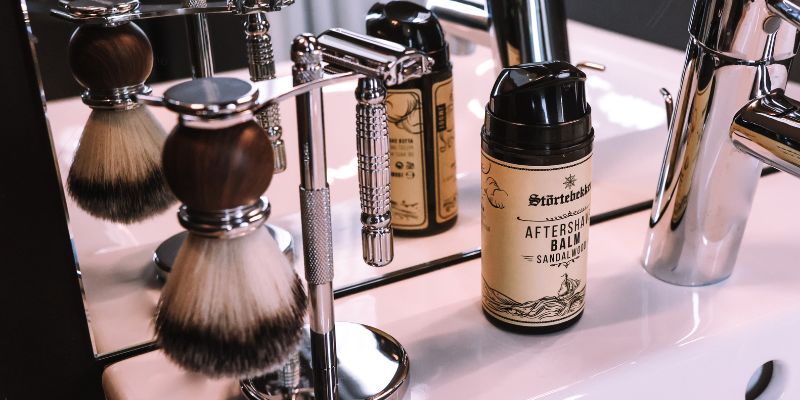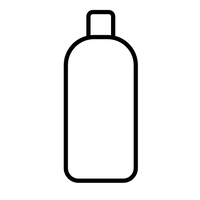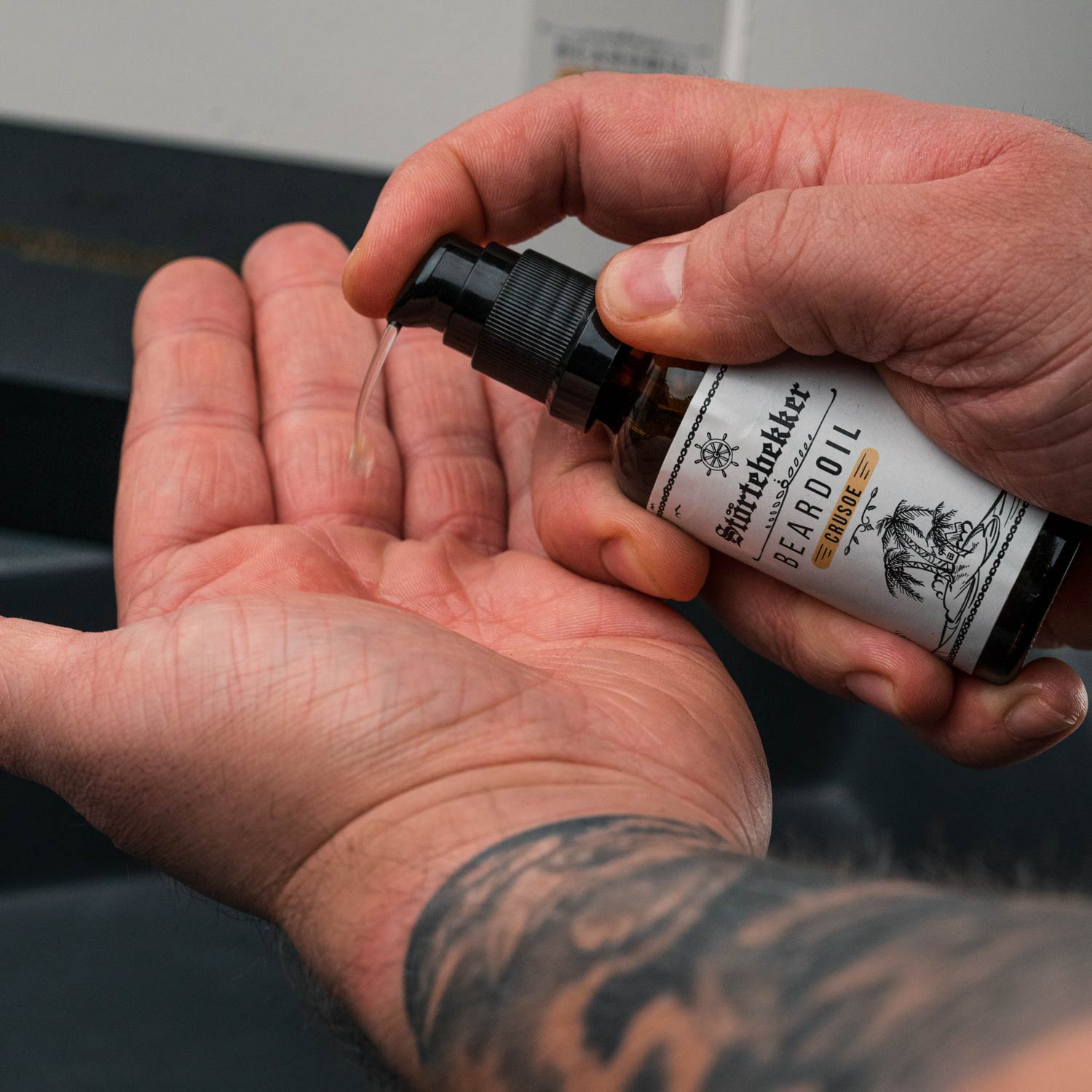Martin is a passionate entrepreneur and avid barbershop visitor. He has deeply immersed himself in the world of shaving and beard care and wants to bring the unique barbershop experience to every bathroom.
It doesn't always have to be beard oil. Although oil-based products are certainly the most common care option for beard hair, there are also (equally good) alternatives.

What are the alternatives to beard oil?
Those who generally don't like oily textures don't have to miss out on optimal beard care. Beard balm, beard cream, or even various home remedies can achieve equally good care results.
Feel free to browse our Störtebekker Shop. Here we have great beard products for your care.
1. Beard Balm
Beard oil or beard balm: Which is better? The choice depends mainly on your personal preferences and needs.
Just like beard oil beard balm consists of beard balm of nourishing oils. Additionally, it contains various fats and waxes, which make its texture somewhat firmer.
For your gym bag or when you're on the go, this might be an advantage – nothing will leak out.
In terms of care, both products are equally effective – both oil and balm benefit your beard hair as well as your skin. They make your skin feel supple and your hair shine. Both products provide moisture to your skin.
A key difference lies in the application. While beard oil is liquid and easily spreads through your beard, you need to warm the balm in your hands first to make it more fluid.
Due to its consistency, beard balm has a lower spreadability – this refers to the property of an oil or fat to spread. The included waxes make the balm not only firmer in texture but also give your beard some hold and styling, which beard oil does not.
You can find beard balm in the shop among other beard products, maybe you'll find something you'd like to try.
2. Beard Cream
Another attractive care product is beard cream. Unlike beard oil, it has a firm consistency. Due to its creamy texture, it absorbs particularly well and quickly into the skin, providing optimal moisture and nutrients for both skin and hair.
A cream can also be especially cooling and soothing for itching and very dry skin – an advantage over oil. Check out this post: Help, My Beard Itches.
Unlike beard oil, you also don't have to worry about oil dripping and making a mess.
However, you should pay attention to the ingredients. While beard oil often contains only a few natural ingredients, beard creams can contain many more components. Not all of them are necessarily good. Make sure there are no silicones, parabens, or other chemical additives in it.
If you are prone to allergies or intolerances, natural beard oil is a better choice for you.

What home remedies can be used as an alternative to beard oil?
Of course, you always have the option to resort to home remedies. We will show you what beard care can actually work with.
Olive Oil: Olive oil is the ultimate care secret of the Mediterranean countries. It absorbs well, provides beard and hair with plenty of moisture, and contains many nourishing substances. Take a few drops and massage them into your skin and hair. However, the smell may not be to everyone's taste.
Coconut Oil: Similar to olive oil, coconut oil also has many nourishing properties. Particularly the lauric acid in it helps the oil to absorb quickly into your skin and make it soft and supple. It also makes your beard hair wonderfully soft. Coconut oil is not as greasy as other base oils.
Rosemary Oil: Rosemary oil has not only many nourishing properties but also a pleasant scent that is natural and not too overpowering. It is therefore also often used as an essential additive for beard oils. However, you can also use it as a separate care oil. Rosemary oil also has anti-inflammatory and antibacterial properties and can help prevent skin redness and inflammation.
For how to properly wash your beard, read this post. If you want to dive deeper into the topic, don't miss the post on optimal beard care.
Beeswax: Beeswax is an ingredient in many beard balms and beard waxes. However, you can also use it alone for your beard care. Due to its firm consistency, it gives your beard hold and helps with styling. Make sure to soften it enough in your hands beforehand so that you can apply it better to your beard. Beeswax has antibacterial properties. So, you are also protecting your skin from inflammation.
Next up are DIY beard oils. Feel free to browse our shop for beard products - just in case you don't feel like mixing your beard oil yourself.
Making Your Own Beard Oil: Here's How
If the mentioned home remedies seem too one-sided, you can always make your own beard oil. By mixing several oils, you can utilize all the different care properties. Your creativity is also (almost) limitless.
To make your own beard oil, you need some good carrier oils and essential oils.
- Carrier oils suitable for beard care are coconut oil or olive oil.
- Next, add fragrance oils. Tea tree oil or rosemary oil is particularly good for your beard.
What you need:
- About 30 ml of carrier oil - olive oil, coconut oil, or jojoba oil.
- Some drops of essential oils for a pleasant scent.
How to make your own beard oil:
- Mix the carrier oils together and shake well.
- Add a few drops of essential oil – 5 to 10 drops are sufficient. Tea tree oil or rosemary oil are wonderful due to their antibacterial properties.
- Shake the mixture well – and your beard oil is ready.
- Ensure that it consists solely of natural ingredients. Store the oil in a dark and dry place and use it up promptly.
Conclusion
There are several good and sensible alternatives to beard oil. However, despite all the alternatives, we are genuine fans of beard oil. The blend of various care oils, the easy application, and the fact that the beard oil from Störtebekker absorbs really well into the skin and hair makes it the perfect care product for us.
What care do you give your beard?
Want more tips on beard care? Then check out these posts:
 Free shipping from
49€
Free shipping from
49€
 100 days return
100 days return
 Festes Shampoo
Festes Shampoo Body Bar
Body Bar Handsoap
Handsoap Pomade
Pomade Gesichtspflege
Gesichtspflege Deo
Deo Hair & Body Wash
Hair & Body Wash Haar Booster
Haar Booster Safety razor
Safety razor Straight razor
Straight razor Shaving soap
Shaving soap Razor blades
Razor blades Shaving accessories
Shaving accessories Beard care
Beard care Beard styling
Beard styling



















